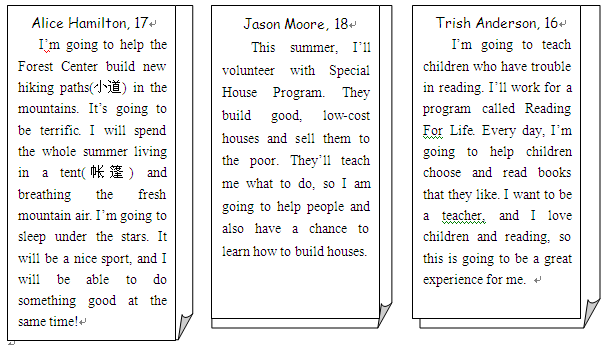题目内容
Small talk is a good way to kill time and make friends. If you travel to other countries, do you know what to say to small talk with local people?
In Britain the best topic is the weather. British changes quite often. It’s a safe topic. You can start small talk simply by saying “It’s a lovely day today, isn’t it?” the weather, it’s good to talk about gardens with English people. For example, you could say, “Those roses look really beautiful, ?” English people love their pets. So it’s also nice to begin with “What a lovely ! What’s its name?”
In America, people like to talk about sports, Amecican football and basketball. They also talk about clothes by saying “It’s a nice shirt! Where did you get it?” The weather is a topic there, too.
Of course, you should avoid a lot of topics during small talk in western countries. Don’t ask people “How old are you?”. Age is usually secret , for women. ask “How much money do you make?” It makes people uncomfortable. Don’t ask strangers whether they have a girlfriend boyfriend. Politics(政治) and religion(宗教) is not a good topic for two people who have just met, either.
小题1:A. end B. start C. speak
小题2:A. weather B. people C. food
小题3:A. Besides B. Except C. But
小题4:A. isn’t it B. aren’t they C. don’t they
小题5:A. picture B. dog C. boy
小题6:A. the same as B. so that C. such as
小题7:A. safe B. dangerous C. hard
小题8:A. extremely B. especially C. exactly
小题9:A. Never B. Usually C. Please
小题10:A. with B. and C. or
In Britain the best topic is the weather. British changes quite often. It’s a safe topic. You can start small talk simply by saying “It’s a lovely day today, isn’t it?” the weather, it’s good to talk about gardens with English people. For example, you could say, “Those roses look really beautiful, ?” English people love their pets. So it’s also nice to begin with “What a lovely ! What’s its name?”
In America, people like to talk about sports, Amecican football and basketball. They also talk about clothes by saying “It’s a nice shirt! Where did you get it?” The weather is a topic there, too.
Of course, you should avoid a lot of topics during small talk in western countries. Don’t ask people “How old are you?”. Age is usually secret , for women. ask “How much money do you make?” It makes people uncomfortable. Don’t ask strangers whether they have a girlfriend boyfriend. Politics(政治) and religion(宗教) is not a good topic for two people who have just met, either.
小题1:A. end B. start C. speak
小题2:A. weather B. people C. food
小题3:A. Besides B. Except C. But
小题4:A. isn’t it B. aren’t they C. don’t they
小题5:A. picture B. dog C. boy
小题6:A. the same as B. so that C. such as
小题7:A. safe B. dangerous C. hard
小题8:A. extremely B. especially C. exactly
小题9:A. Never B. Usually C. Please
小题10:A. with B. and C. or
小题1:B
小题2:A
小题3:A
小题4:C
小题5:B
小题6:C
小题7:A
小题8:B
小题9:A
小题10:C
试题分析: 闲聊是一种消磨时间的好方法,但是在不同的国家闲聊要选好正确的话题。文中作者介绍给我们几种话题。比如在英国我们可以以天气,花园等开始聊天,在美国我们可以以服装,运动等开始聊天。总之不要问年纪,收入等隐私问题。
小题1:考查动词及语境的理解。A. end结束,B. start开始,C. speak说,讲。句意:如果你去了另一个国家,你知道怎么跟当地人开始聊天吗?故选B。
小题2:考查名词及语境的理解。A. weather天气,B. people人们,C. food食物,根据In Britain the best topic is the weather.可知英国的天气变化非常快。故选A。
小题3:考查连词及语境的理解。A. Besides除了(包含在内),B. Except 除了(不包含在内),C. But但是,句意:除了谈论天气,还可以谈论花园。故选A。
小题4:考查反意疑问句及语境的理解。反意疑问句遵循前肯后否,前否后肯,句意:这些玫瑰看起来真漂亮,不是吗?故选C。
小题5:考查名词及语境的理解。A. picture照片,B. dog狗,C. boy男孩儿,根据English people love their pets英国人也非常喜欢他们的宠物,故选B。
小题6:考查短语及语境的理解。A. the same as和……一样,B. so that因此,C. such as像,例如。句意:比如美国足球,美国篮球。故选C。
小题7:考查形容词及语境的理解。 A. safe安全的,B. dangerous危险的,C. hard困难的,根据too,可知在美国谈论天气也是安全的话题,故选A。
小题8:考查副词短语及语境的理解。A. extremely非常,及其,极端地,B. especially特别地,C. exactly精确地,正确地,句意:年龄是一个秘密,特别是对女士来说。故选B。
小题9:考查副词及语境的理解。A. Never永远不,从不,B. Usually通常地,C. Please请,根据It makes people uncomfortable.那使人不舒服,可知永远不要问你赚多少钱?故选A。
小题10:考查连词及语境的理解。选择疑问句,or或者。句意:不要问别人是否有女朋友或者是男朋友。故选C。

练习册系列答案
 金钥匙试卷系列答案
金钥匙试卷系列答案
相关题目




